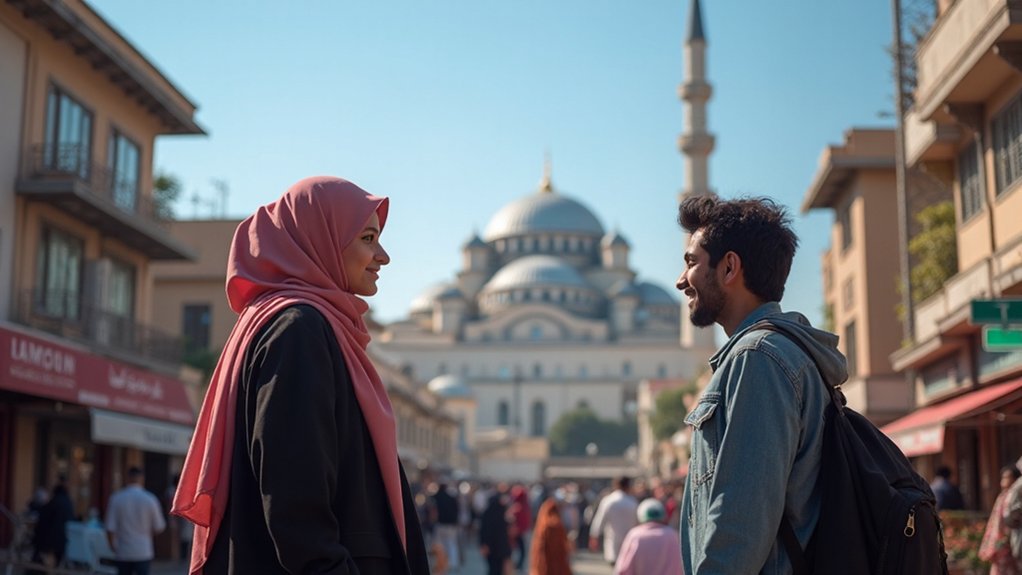
Ramadan at home: what I learned by fasting Ramadan for one day as a Christian
Practices of love and devotion flourish as Muslim families celebrate Ramadan at home, but what unique traditions truly deepen their connections?
When discussing Islam and Muslim, it’s important to understand the key distinctions between these two terms. Islam is the name of the religion itself, encompassing its beliefs, values, and practices. In contrast, a Muslim is a person who follows the teachings of Islam in daily life. Recognizing the difference between Islam and Muslim can help clear up common misunderstandings and provide a deeper understanding of this faith. So, what are the fundamental beliefs that define Islam, and how do Muslims incorporate these principles into their lives?

Exploring the differences between Islam and Muslim can offer valuable insights and broaden your perspective.
Islam is a monotheistic religion that emphasizes the belief in one God, known as Allah in Arabic.
At its heart, Islam teaches followers to live a life guided by faith, compassion, and responsibility. Practicing Islam involves following the teachings of the Prophet Muhammad, performing daily acts of worship, and observing the Five Pillars of Islam.
These fundamental practices help shape a Muslim’s daily routine and spiritual journey. By embracing Islam, millions of people around the world find meaning, community, and a sense of purpose in their lives.
A Muslim is a person who follows the faith and teachings of Islam.
Being a Muslim means believing in one God, practicing regular prayer, and participating in important rituals like fasting during Ramadan.
Many Muslims also take part in community events and support one another through acts of charity.
Identifying as a Muslim connects you to a worldwide community that shares common beliefs and values.
Embracing life as a Muslim involves both personal devotion and active involvement in the global Muslim community.
If you’re interested in understanding the core beliefs of Islam, it’s important to start with the concept of Tawhid, which highlights the oneness of God.
The core beliefs of Islam teach that there’s no deity but Allah, establishing a strong foundation for faith. In addition to Tawhid, the core beliefs of Islam include the Five Pillars: faith, prayer, charity, fasting, and pilgrimage.
These core beliefs of Islam shape every aspect of a Muslim’s daily life, guiding both spiritual and practical decisions.
Understanding the characteristics of a Muslim is essential for appreciating the values that guide their daily lives.
The characteristics of a Muslim include compassion, honesty, and humility, which form the foundation of their interactions with others. Muslims strive for justice and are encouraged to seek knowledge, strengthening the bond within their community.
The characteristics of a Muslim also involve letting faith guide everyday actions, promoting peace and respect for all. By embracing spiritual growth and self-reflection, Muslims continuously develop positive traits that reflect the core characteristics of a Muslim.
Cultural versus religious identity is an important topic that shapes how people see themselves and connect with others.
When considering cultural versus religious identity, it’s clear that the two often overlap, especially in communities like Muslims.
While religious identity focuses on beliefs and spiritual practices, cultural versus religious identity highlights how traditions, customs, and everyday experiences also play a key role.
Understanding the balance between cultural versus religious identity can help you appreciate the diverse ways people express who they’re and find belonging.
Faith in Islam is a powerful force that guides millions of people every day. This faith in Islam shapes how you live, influences your choices, and builds a strong sense of belonging within your community.
Diversity within the Muslim community is one of its most defining features. While many people may think of Islam as a single, unified tradition, the Muslim community actually includes a wide range of cultures, languages, and customs.
Diversity within the Muslim community can be seen in the different sects—like Sunni and Shia—each offering unique interpretations and practices of the faith. This diversity within the Muslim community helps create a rich blend of experiences and perspectives, allowing individuals to shape their own identities while sharing a common spiritual foundation.
Many people have misconceptions about Islam and Muslims, often influenced by stereotypes and misleading media coverage.
One common misconception about Islam and Muslims is the belief that the religion encourages violence or extremism. In reality, most Muslims value peace, compassion, and understanding.
In conclusion, understanding the distinctions between Islam and Muslims is key to truly appreciating the depth and diversity of this faith. Islam refers to the religion itself—the beliefs, teachings, and practices outlined in its sacred texts.
Muslims, on the other hand, are the individuals who follow Islam and strive to live according to its principles. Recognizing the differences between Islam and Muslims is essential for clearing up common misconceptions and building a more accurate perspective. By learning about Islam and its followers, you can foster respect, promote understanding, and engage more thoughtfully with people from the Muslim community in our global society.

Practices of love and devotion flourish as Muslim families celebrate Ramadan at home, but what unique traditions truly deepen their connections?

Uncover the profound meanings behind the hijab in Islam and discover why it holds such significance in a Muslim's life.

In understanding why Eid Al-Fitr is important in Islam, one uncovers a tapestry of traditions, gratitude, and community that beckons deeper exploration.

Motivations behind Muslim women wearing hijab vary widely, blending faith, culture, and empowerment; discover what truly drives these profound choices.

Muslim women must navigate modesty in fashion; discover five clothing types that could compromise your values and confidence. Will your wardrobe make the cut?

Prepare to uncover the 5 best ways to explain hijab to girls and discover how these insights can transform their understanding.